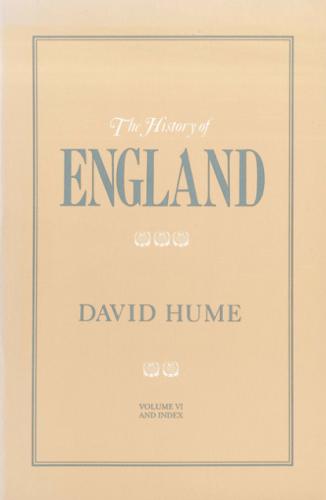The History of England Volume VI. David Hume
THE HISTORY
OF ENGLAND
VOLUME VI
This book is published by Liberty Fund, Inc., a foundation established to encourage study of the ideal of a society of free and responsible individuals.
The cuneiform inscription that serves as our logo and as a design element in Liberty Fund books is the earliest-known written appearance of the word “freedom” (amagi), or “liberty.” It is taken from a clay document written about 2300 B.C. in the Sumerian city-state of Lagash.
Foreword © 1983 by Liberty Fund, Inc.
Margin notes have been moved from the margin of the paragraph in the print edition to precede the paragraph in this eBook, in a smaller font.
This eBook edition published in 2013.
eBook ISBN: E-PUB 978-1-61487-169-9
CONTENTS
OF THE SIXTH VOLUME
LXV
A parliament — The cabal — Their characters — Their counsels — Alliance with France — A parliament — Coventry act — Blood’s crimes — Duke declares himself catholic — Exchequer shut — Declaration of indulgence — Attack of the Smyrna fleet — War declared with Holland — Weakness of the States — Battle of Solebay — Sandwich killed — Progress of the French — Consternation of the Dutch — Prince of Orange Stadtholder — Massacre of the de Wits — Good conduct of the prince — A parliament — Declaration of indulgence recalled — Sea-fight — Another sea-fight — Another sea-fight — Congress of Cologne — A parliament — Peace with Holland
LXVI
Schemes of the cabal — Remonstrances of Sir William Temple — Campaign of 1674 — A Parliament — Passive obedience — A Parliament — Campaign of 1675 — Congress of Nimeguen — Campaign of 1676 — Uncertain conduct of the King — A Parliament — Campaign of 1677 — Parliament’s distrust of the King — Marriage of the Prince of Orange with the Lady Mary — Plan of peace — Negociations — Campaign of 1678 — Negociations — Peace of Nimeguen — State of affairs in Scotland
LXVII
The Popish plot — Oates’s narrative — and character — Coleman’s letters — Godfrey’s murther — General consternation — The parliament — Zeal of the parliament — Bedloe’s narrative — Accusation of Danby — His impeachment — Dissolution of the long parliament — Its character — Trial of Coleman — Of Ireland — New elections — Duke of Monmouth — Duke of York retires to Brussels — New parliament — Danby’s impeachment — Popish plot — New council — Limitations on a popish successor — Bill of exclusion — Habeas corpus bill — Prorogation and dissolution of the parliament — Trial and execution of the five jesuits — and of Langhorne — Wakeman acquitted — State of affairs in Scotland — Battle of Bothwel bridge
LXVIII
State of parties — State of the ministry — Meal-tub plot — Whig and Tory — A new parliament — Violence of the commons — Exclusion bill — Arguments for and against the exclusion — Exclusion bill rejected — Trial of Stafford — His execution — Violence of the commons — Dissolution of the parliament
